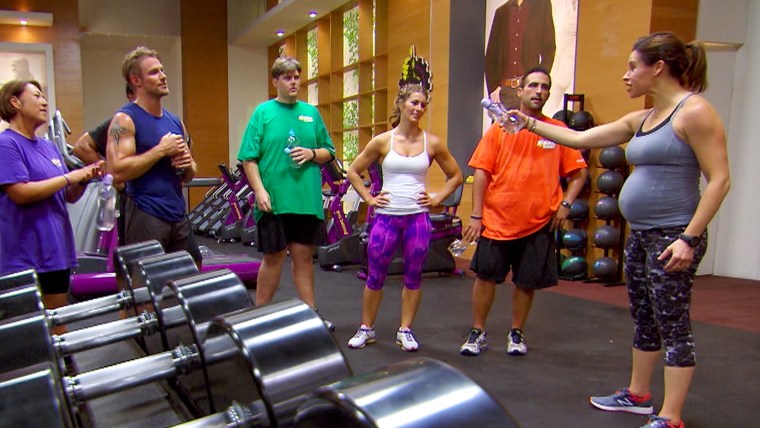When you’re 9 months pregnant and doing push-ups, you’re bound to get some attention.
The gasping stares from strangers were actually fun for TODAY lifestyle and fitness correspondent Jenna Wolfe, who gave birth to her first child in 2013 after a very active pregnancy and is now expecting baby number two.
But is it OK to work out — and work out hard — when you are so very pregnant?
In a word, yes... with a few caveats.

“If you've been working out all your life, you'd be doing a disservice to your body to stop all activity during a pregnancy,” Jenna told TODAY Parents. “When asked how I stay sane and focused both at home and at work, I usually point to the gym. It has always been my stress reliever.”
When she first became pregnant, Jenna worried that she’d have to cut back on her exercise time and intensity, but found that wasn't the case, especially for the first six months. As her delivery date neared, she limited her cardio to walking, biking and swimming, but kept lifting light weights. This time around, she has eased up a little in the last weeks of her pregnancy, on her doctor's advice.
Watch her in action on a recent morning:
Jenna is not the only one causing a stir. Heavily pregnant women are running, weight-lifting, surfing, dancing ballet, performing acrobatics, and finishing marathons.
Exercise is good, but it all depends on what your body is used to doing.
Being active for at least 30 minutes a day offers lots of important benefits for pregnant women, according to the American Congress of Obstetricians and Gynecologists. It recommends walking, swimming, cycling and aerobics.
Doctors say what you do all depends on your routine before you became pregnant. You can generally continue your baseline level of activity as your belly grows, with some exceptions.
“Pregnancy is not a great time to start training for a marathon, but if you are a long-distance runner, it is reasonable to continue to run through the pregnancy,” said Dr. Errol Norwitz, chairman of the department of obstetrics and gynecology at Tufts Medical Center in Boston.
“If you’re somebody who maintains a very high level of exercise and fitness and you’re managing to do that without excessively stressing yourself, I would think that you’re fine all the way through to delivery.”

This is not the time to learn a new sport, cautioned Dr. Iffath Hoskins, vice chair of patient safety and quality in the department of obstetrics and gynecology at NYU Langone Medical Center.
She advises patients to ratchet down very intense workouts and pay attention to their breathing. The goal is to be able to carry on a conversation.
“If you’re panting and gasping, that’s not good because if you’re not able to get enough (air), how are you going to share with the baby?” she said.
Here are more guidelines from Norwitz, Hoskins and ACOG:
Off limits sports
Activities that are no-no’s during pregnancy include contact sports, like hockey, basketball, and soccer, where someone can bump into your belly or you can get injured.
Don’t go scuba diving, which can put the fetus at risk of decompression sickness.
Avoid any activity where there’s a risk of falling, like horseback riding, downhill skiing and gymnastics. Norwitz actually had a patient who wanted to go heli-skiing—or jump out of a helicopter to ski down a mountain—in her third trimester. “We discouraged that,” he said.
Be aware of changes to your body
Your center of gravity as a pregnant woman is very different, Hoskins said. Plus, your body is looser as the hormone progesterone prepares your joints for the baby’s delivery, so you’re more likely to pull something, she added. That means added vigilance in activities like yoga.
Don’t lie flat on your back
Avoid this position after 20 weeks because the uterus will push on the big blood vessels that run along your spine and affect the blood return to your heart.
Listen to your body
If you’re finding a workout difficult, then back off, Norwitz said. The goal of exercise is often to push your body to new levels, but that’s not what you want when you’re pregnant, Hoskins added. You’re better off keeping it a little bit easier.
“You are the smartest person regarding you and your baby,” she said.